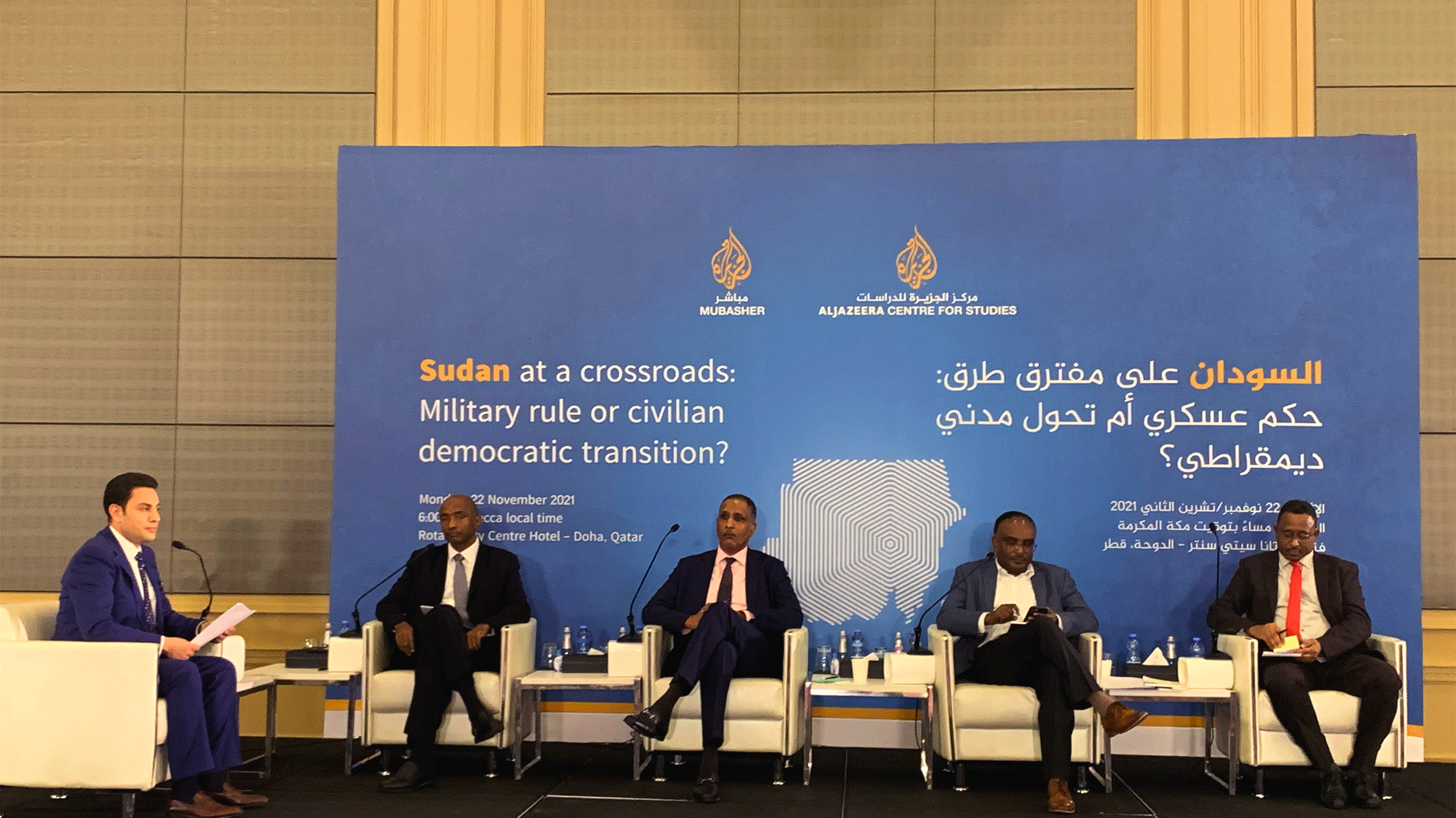
Al Jazeera Centre for Studies and Al Jazeera Mubasher hosted a seminar on Monday, 22 November 2021, in Doha entitled, “Sudan at a crossroads: Military rule or civilian democratic transition?” Its participants were: Ahmed Ibrahim Abushouk, professor of modern and contemporary history at Qatar University; Elwaleed Adam Madibo, expert in governance and global development and chairman of the Development Policy Platform; Nimir Osman Elbashir, academic and expert in Sudanese affairs; and Abubaker Mohamed Ahmed Ibrahim, academic coordinator of the Islamic Studies programme at the College of Shariaa and Islamic Studies at Qatar University. The seminar was moderated by Al Jazeera Mubasher presenter Salem Almahroukey, and attended by members of the Sudanese community and those interested in Sudanese affairs.
The seminar’s discussions addressed the current situation in Sudan, especially after the military component of the transitional authority removed its partner, the civilian component, on 25 October 2021, declared a state of emergency, dissolved the Sovereignty Council - and released its members – as well as the Council of Ministers, put Prime Minister Abdallah Hamdok under house arrest, detained a number of ministers, and suspended most of the articles of the constitution. The discussions also explored the reasons that led Sudan to this situation, how to get out of it, and the measures to be taken to overcome the transitional period safely.
The speakers’ readings of what transpired varied as did their visions. Moreover, the common denominator between them is their description of the events as a coup by the military in which it overthrew its civilian partners, capitalising on the country’s fragile economic situation and the fragmentation of political forces – a chaos which the military itself had contributed to directly at times and indirectly at others.
The speakers also agreed that the military component, like the civilian component, is not a homogenous bloc, that differences arise within their ranks, and that the military’s bias towards the Sudanese revolution that overthrew Omar al-Bashir in 2019 was not a bias towards democracy but an attempt to absorb popular anger and buy time in order to restore military dominance over Sudanese political life.
In addition, they agreed that what has protected the Sudanese revolution up to this point is the awareness of the Sudanese people, especially the youth who want a complete break from the past, reject the military’s tutelage of the society and state, and are therefore prepared to make more sacrifices.
The speakers even agreed on the role of the external factor in what had occurred and will occur, whether the role encourages or opposes the coup.
Moreover, they concurred that Sudan is accustomed to coups, that the current transitional period is the fifth in its modern history, and that the Sudanese agree every time on the necessity of deposing the regime but disagree afterwards about the priorities of the national agenda that should be followed in order for the country’s new political regime to be established. They also maintained that throughout these periods, there has never been a patriotic, unifying national figure with charisma around whom everyone gathers and who takes pride in his speech and vision of political differences and regional fanaticism.
However, the speakers disagreed in their readings of the political agreement between the chairman of the Sovereignty Council and commander-in-chief of the Sudanese army, Lieutenant General Abdel Fattah al-Burhan, and Prime Minister Abdallah Hamdok that was announced on Sunday, 21 November 2021, and that provided that the two parties are committed to managing the transitional period according to the framework of a partnership between the national political and civil forces, the military component, the civil administration, the resistance committees, live revolutionary forces, the youth sector, women, and members of Sufi orders to ensure the timely transfer of power to an elected civil government, the release of political detainees, the investigation of the killing of protesters, and the accountability of those involved. Some consider the agreement a retreat by the civil forces and a submission to the pressures of the military. In this regard, it was mentioned that Hamdok lost the political support that brought him to power when he signed the agreement. Also, it was implied that what had happened on 25 October was a rectification of the course rather than a military coup. However, others viewed it positively overall as a meeting in the middle between the civilians and the military, believing that it would vindicate the Sudanese.
The seminar concluded, with a discussion about the future of Sudan based on the past two years, that this future is tied to the restoration of coherence and unity among the civilians; agreement on the priorities that will accomplish a safe democratic transition for the country; and the conviction of the military component that governing the country singlehandedly is a thing of the past, especially with the rise of society’s revolutionary awareness, that sole military rule of the country is bound to fail and prompt another revolution, and that the best for everyone – both civilians and military – is agreement on a formula for long-term and sustainable cooperation. This, in turn, would enable the civilians to manage the affairs of the country without the military’s inference or tutelage while the military continues to perform its duties in terms of security, protection and defence, through its rehabilitation and modernisation as well as that of the police.